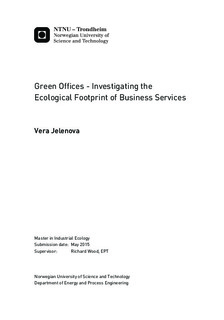Green Offices - Investigating the Ecological Footprint of Business Services
Master thesis
Permanent lenke
http://hdl.handle.net/11250/2350063Utgivelsesdato
2015Metadata
Vis full innførselSamlinger
Sammendrag
The ecological conservation is a subject of public attention. Among the most discussed issues are (1) the environmental footprint, (2) the biocapacity limits and (3) the ecological overshoot. The Ecological footprint (EF) is an appropriate approach to face the size of the environmen- tal impacts. The nowadays studies are mostly either not related to office space/business envi- ronments or they only focus on greenhouse gases. The aim of this thesis is to develop an EF structure suitable for WWF Oslo office case study. In the scope of this project various data from CREEA project and WWF Oslo accounting system were analyzed. Based on the analysis the Eu- ropean Union, Norwegian and WWF Oslo case study about the EF was provided. The analyse presents structure of the EF and the values for all three cases. The results shows the WWF Oslo EF per full time employee as less than half of the Norwegian and the European Union standards. The results shows unequal distributed impacts across identified sectors. According to the re- sults, the main impacts of the WWF Oslo office are from Food and Other Services sectors.
